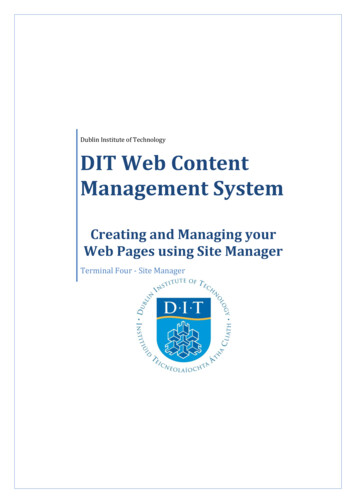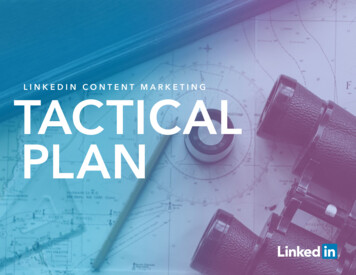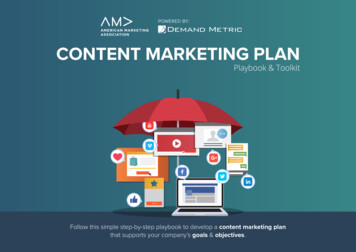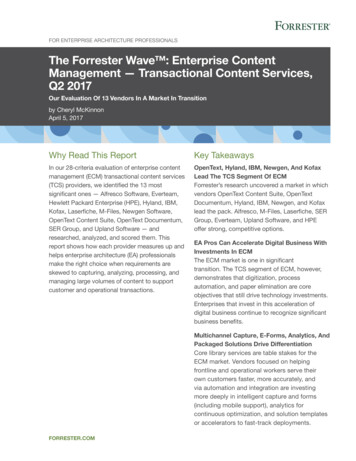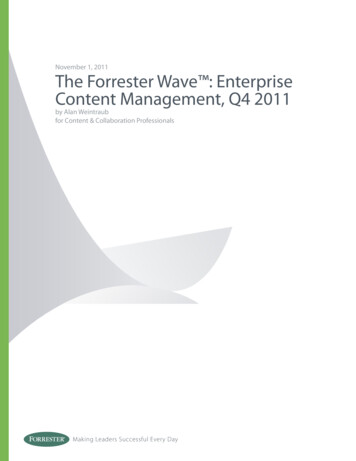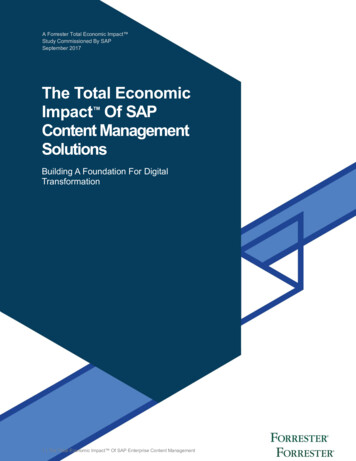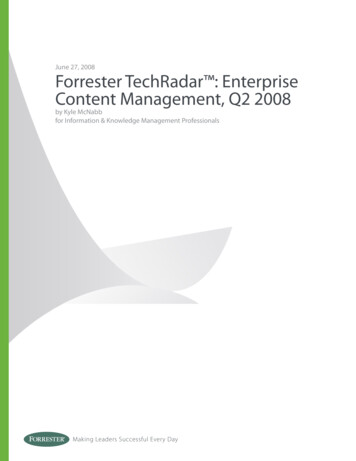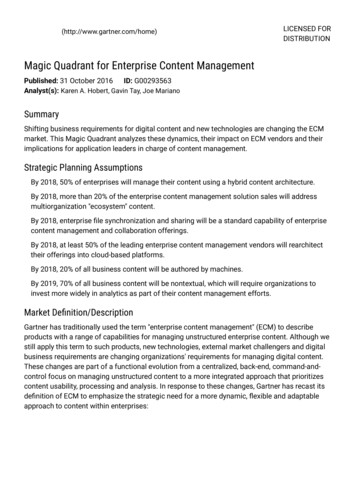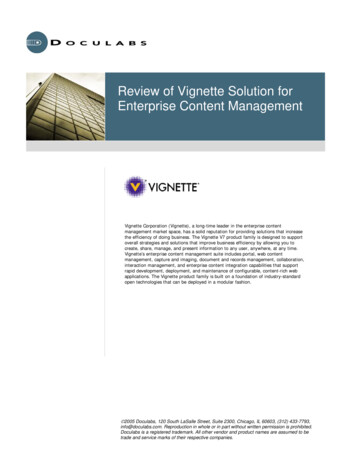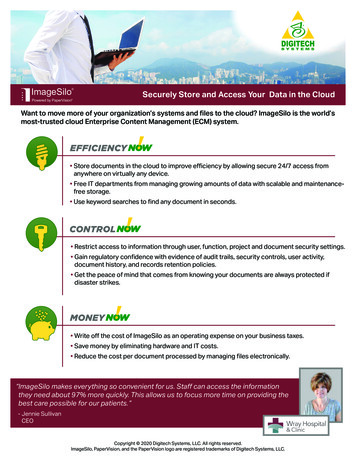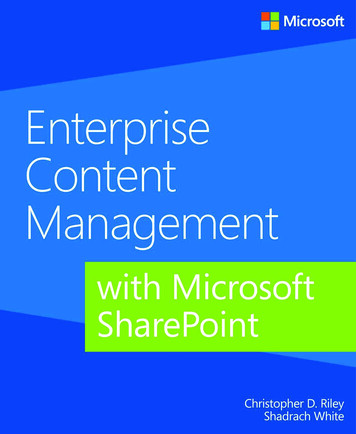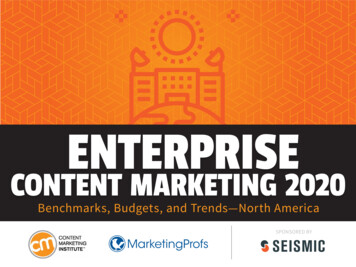
Transcription
ENTERPRISECONTENT MARKETING 2020Benchmarks, Budgets, and Trends—North AmericaSPONSORED BY
TABLE OF CONTENTSmmmWELCOME. 3KEY FINDINGS. 4COMPARISON CHART: ORGANIZATIONS THAT PROVIDEOPTIMAL CUSTOMER EXPERIENCES ACROSS THEENGAGEMENT JOURNEY VS. ALL RESPONDENTS. 5mSUCCESS & MATURITY. 6mSALES ALIGNMENT & ABM USE. 8mSTRATEGY, OPINIONS & TECHNOLOGY. 12SURVEY TERM DEFINITIONSContent Marketing: A strategic marketingapproach focused on creating and distributingvaluable, relevant, and consistent content toattract and retain a clearly defined audience—and,ultimately, to drive profitable customer action.Success: Achieving your organization’s desired/targeted results.NOTEmTEAM STRUCTURE & OUTSOURCING. 16mCONTENT CREATION & DISTRIBUTION. 20mMETRICS & GOALS. 29mBUDGETS & SPENDING. 34mCONTENT MARKETING PRIORITIES & UNIQUE CHALLENGES. 38Use caution if making comparisons with past years.The survey methodology changed beginning withthe 2019 version of this report, when we beganasking respondents to confirm their contentmarketing role and whether their organization hasused content marketing for at least one year.SPONSORED BY2
WELCOMEWelcome to Enterprise Content Marketing 2020: Benchmarks,Budgets, and Trends—North America. This report shows howfor-profit enterprise marketers—those working in organizations with1,000-plus employees—answered the questions on the 10th annualCMI/MarketingProfs content marketing survey.The research shows that enterprise content marketers—like theirpeers in smaller companies—are still heavily focused on top-of-funnelactivities such as building brand awareness and generating leads. Inaddition, their top challenge is trying to coordinate efforts across theenterprise, making it unsurprising that fewer than half (44%) agree theirorganization delivers optimal experiences across the buyer’s journey.The ability to deliver seamless experiences will require communicationand commitment between many groups within the enterprise,underpinned by strategy and technology.Enterprise content marketers appear well positioned to meet thechallenges. Here’s to a productive 2020 filled with collaborationand success!Stephanie StahlGeneral Manager, CMIRobert RoseChief Strategy Advisor, CMIKim MoutsosVP Content, CMICathy McPhillipsVP Marketing, CMILisa Murton BeetsResearch Director/Report Author, CMIJoseph “JK” KalinowskiCreative Director, CMINancy ReeseResearch ConsultantSPONSORED BY3
KEY FINDINGS Enterprise marketers have become more strategic with content marketingNearly half (46%) report their organization has a documented content marketing strategy—up 10 percentage points fromlast year (36%), as reported in the 2019 version of this report. (See page 13.) Coordinating efforts across the enterprise continues to be a challengeOur 2019 research showed the top challenge unique to enterprise marketers was “coordinating content marketing effortsamong multiple departments and brands,” which is also the case for 2020 (62% cite it as their top challenge). (See page 40.) Room for improvement with providing seamless customer experiencesFewer than half (44%) of enterprise marketers agree their organization provides customers with optimal experiencesacross the engagement journey. (See page 14.) There are opportunities to use content marketing more profitably farther down the sales funnelAround half (49%) used content marketing successfully in the last 12 months to generate sales/revenue (up from 39%reported in 2019). While up from 2019, that’s still only half—far more are focused on early-stage content marketingactivities, such as creating brand awareness (83%). This makes sense, considering respondents say nearly 50% ofthe content created in the last 12 months was for the top-of-the-funnel. Furthermore, there is room for improvedcommunication between content marketing and sales (27% report the two functions are not very/not at all aligned withintheir organization). (See pages 10, 23, and 33.)SPONSORED BY4
KEY FINDINGSDifferences Between Those Who Provide Optimal Customer Experiences Across theEngagement Journey and All Enterprise RespondentsAll EnterpriseRespondentsThose Who ProvideOptimal ExperiencesOrganization is extremely/very successful with content marketing29%51%Has a documented content marketing strategy46%62%Content marketing and sales are extremely/very aligned21%36%Uses account-based marketing (ABM)44%53%Uses metrics and has KPIs to measure content initiatives74%88%Measures content marketing return on investment (ROI)49%66%Build credibility/trust66%77%Generate sales/revenue49%64%Prioritizes audience’s informational needs over organization’s sales/promotional message54%70%Crafts content based on specific stages of the customer journey49%64%Prioritizes delivering relevant content when and where a person is most likely to see it68%89%Values creativity and craft in content creation and production68%84%Uses content marketing successfully to:Always/frequently:Strongly/somewhat agrees:Chart term definition: “Those who provide optimal experiences” are respondents who strongly/somewhat agreed their organization provides customers with optimal experience across their engagement journey (see page 14).Base: Enterprise content marketers.2020 Enterprise Content Marketing Benchmarks: Content Marketing Institute/MarketingProfsSPONSORED BY5
SUCCESS & MATURITYSPONSORED BY6
SUCCESS & MATURITYAround one-third of enterprise marketers report their organization is extremely orvery successful with its overall content marketing approach.How Enterprise Marketers RateTheir Organization’s Overall Level ofContent Marketing Success1%3% 0%6%16%23%54%How Enterprise Marketers RateTheir Organization’s Content MarketingSuccess Compared With One Year Ago Extremely Successful Very Successful Moderately Successful Minimally Successful Not At All SuccessfulBase: Enterprise content marketers; aided list.2020 Enterprise Content Marketing Benchmarks: Content Marketing Institute/MarketingProfs16%32%49% Much More Successful Somewhat More Successful About the Same Somewhat Less Successful Much Less SuccessfulBase: Enterprise content marketers; aided list.2020 Enterprise Content Marketing Benchmarks: Content Marketing Institute/MarketingProfsNote: The survey defined success as achieving your organization’s desired/targeted results.SPONSORED BY7
SUCCESS & MATURITY47% of respondents say their organization is in the sophisticated/mature phase of contentmarketing maturity.How Enterprise Marketers Rate TheirOrganization’s Content Marketing Maturity Level0%5%11%19%36%29% Sophisticated Mature Adolescent Young First Steps UnsureBase: Enterprise content marketers; aided list.2020 Enterprise Content Marketing Benchmarks: Content Marketing Institute/MarketingProfsSOPHISTICATEDProviding accurate measurement to the business, scalingacross the organizationMATUREFinding success, yet challenged with integration acrossthe organizationADOLESCENTHave developed a business case, seeing early success,becoming more sophisticated with measurement andscalingYOUNGGrowing pains, challenged with creating a cohesivestrategy and a measurement planFIRST STEPSDoing some aspects of content, but have not yet begun tomake content marketing a processSPONSORED BY8
SALES ALIGNMENT& ABM USESPONSORED BY9
SALES ALIGNMENT & ABM USE21% of enterprise marketers say content marketing and sales are extremely/very alignedin their organization.How Enterprise Marketers Rate Alignment ofContent Marketing and Sales in Their Organization1%6%5%16%21%51% Extremely Aligned Very Aligned Somewhat Aligned Not Very Aligned Not At All Aligned Does Not Apply – we do notemploy a sales functionBase: Enterprise content marketers; aided list.2020 Enterprise Content Marketing Benchmarks: Content Marketing Institute/MarketingProfsNote: The survey broadly defined content marketing and sales alignment as a collaborative working relationship that results in positive business results.SPONSORED BY10
SALES ALIGNMENT & ABM USE44% of enterprise marketers said their organization used account-based marketing in 2019;another 20% said they planned to prior to year-end 2019.Enterprise Marketers’ Use ofAccount-based Marketing (ABM) in 201910%26%44% Yes No, but planned to in 2019 No, with no plans Unsure20%Base: Enterprise content marketers; aided list.2020 Enterprise Content Marketing Benchmarks: Content Marketing Institute/MarketingProfsNote: The survey defined account-based marketing (ABM) as an approach that concentrates sales and marketing resources on a clearly defined set oftarget accounts within a market and employs personalized marketing campaigns designed to resonate with each account.SPONSORED BY11
STRATEGY, OPINIONS& TECHNOLOGYSPONSORED BY12
STRATEGY, OPINIONS & TECHNOLOGY78% of enterprise marketers have a content marketing strategy; of those, 46% havedocumented it.Percentage of Enterprise MarketersWith a Content Marketing Strategy7%15%46%32% Yes, and it is documented Yes, but it is not documented No, but plan to within 12 months No, with no plansBase: Enterprise content marketers; aided list.2020 Content Marketing Benchmarks: Content Marketing Institute/MarketingProfsSPONSORED BY13
STRATEGY, OPINIONS & TECHNOLOGYFewer than half (44%) of enterprise marketers agree their organization provides customerswith optimal experiences across the engagement journey.Enterprise Marketers’ Opinions About Content Marketing in Their Organization(Strongly/Somewhat Agree)Our audience views our organizationas a credible and trusted resource85%Our organization prioritizes delivering relevant contentwhen and where a person is most likely to see it68%Our organization values creativity andcraft in content creation and production68%Our organization provides customers withoptimal experiences across their engagement journey44%020406080100Base: Enterprise content marketers who answered each statement.2020 Enterprise Content Marketing Benchmarks: Content Marketing Institute/MarketingProfsSPONSORED BY14
STRATEGY, OPINIONS & TECHNOLOGYThe top three technologies enterprise marketers use to assist with content marketing are analyticstools (89%), email marketing software (88%), and social media publishing/analytics (86%).Other technologies used:Digital Asset Management(DAM) System (38%); ContentDistribution Platform (32%);Content Performance/Recommendation Analytics(27%); Content Optimization(21%); and Integrated ContentMarketing Platform (13%).Technologies Enterprise Organizations Useto Assist With Content Marketing(Top 7)Analytics Tools (e.g., web analytics, dashboards)89%Email Marketing Software88%86%Social Media Publishing/Analytics69%Customer Relationship Management (CRM) System53%Content Creation/Collaboration/Workflow48%Content Management System (CMS)46%Marketing Automation System (MAS)020406080100Base: Enterprise content marketers. Aided list; multiple responses permitted.2020 Enterprise Content Marketing Benchmarks: Content Marketing Institute/MarketingProfsSPONSORED BY15
TEAM STRUCTURE& OUTSOURCINGSPONSORED BY16
TEAM STRUCTURE & OUTSOURCINGThe most commonly reported team structure is a combination of both a centralized groupand individual teams throughout the organization (39%).Enterprise Organizations’ Content Marketing Team StructureWe have a centralized content marketing group thatworks with multiple brands/products/departmentsthroughout the organization26%Each brand/product/department has itsown content marketing team18%Both—We have a centralized group andindividual teams throughout the organization39%We have a small (or one-person) marketing/contentmarketing team serving the entire organization15%2%Other structures01020304050Base: Enterprise content marketers; aided list.2020 Enterprise Content Marketing Benchmarks: Content Marketing Institute/MarketingProfsSPONSORED BY17
TEAM STRUCTURE & OUTSOURCING28% of enterprise marketers report their organization has six or more internal team membersdedicated full-time to content marketing.Enterprise Organizations’Content Marketing Team Size(Full-Time/Dedicated to Content Marketing)14%14%11%14%47% 0 1 2-5 6-10 11 Base: Enterprise content marketers; aided list.2020 Enterprise Content Marketing Benchmarks: Content Marketing Institute/MarketingProfsSPONSORED BY18
TEAM STRUCTURE & OUTSOURCING70% of enterprise marketers outsource at least one content marketing activity; contentcreation is the activity they’re most likely to outsource (88%).Does Your Enterprise OrganizationOutsource Any Content Marketing Activities?Content Marketing Activities EnterpriseOrganizations Outsource88%Content Creation30% 70% YesNo34%Content Distribution27%Content Technology18%Content Strategy14%Measurement12%Editorial PlanningBase: Enterprise content marketers.2020 Enterprise Content Marketing Benchmarks: Content Marketing Institute/MarketingProfs17%Other020406080100Base: Enterprise content marketers whose organization outsources at least one content marketing activity. Aidedlist; multiple responses permitted.2020 Enterprise Content Marketing Benchmarks: Content Marketing Institute/MarketingProfsSPONSORED BY19
CONTENT CREATION& DISTRIBUTIONSPONSORED BY20
CONTENT CREATION & DISTRIBUTIONHalf of enterprise marketers (49%) always/frequently craft content based on specific stages of thecustomer journey.Concepts Enterprise Marketers Always/Frequently Take Into AccountWhile Creating Content for Their Organization92%Fact check our content to ensure accuracyPrioritize the audience’s informational needsover our sales/promotional message54%Craft content based on specific stagesof the customer journey49%020406080100Base: Enterprise content marketers who answered each concept.2020 Enterprise Content Marketing Benchmarks: Content Marketing Institute/MarketingProfsSPONSORED BY21
CONTENT CREATION & DISTRIBUTIONAlmost half (46%) of enterprise marketers create content for six or more audiences.Number of Different AudiencesEnterprise Marketers Create Content For3%26%46% 6 4-5 2-3 125%Base: Enterprise content marketers; aided list.2020 Enterprise Content Marketing Benchmarks: Content Marketing Institute/MarketingProfsSPONSORED BY22
CONTENT CREATION & DISTRIBUTIONAlmost half (47%) of the content enterprise marketers created in the last 12 months was foraudiences in the early stages of the customer journey.Percentage of Total ContentEnterprise Marketers Created forContent Marketing in Last 12 Months3%12%17%21% 47%Top-of-the-funnel(generating awareness/interest) Mid-funnel (consideration/intent) Late-stage (evaluation/purchase) Post-sale (loyalty/brand advocacy) Other areasBase: Enterprise content marketers who answered the question; aided list. Percentages were required to equal 100%.2020 Enterprise Content Marketing Benchmarks: Content Marketing Institute/MarketingProfsSPONSORED BY23
CONTENT CREATION & DISTRIBUTIONThe top five types of content enterprise marketers use are social media content (94%), videos(86%), blog posts/short articles (83%), email newsletters (81%), and in-person events (77%).Content Types Enterprise Marketers Used in Last 12 Months(Top 9)94%Social Media Content (e.g., tweets, stories)86%Videos (excluding livestreaming)83%Blog Posts/Short Articles81%Email Newsletters77%In-Person Events73%Infographics/Charts/Photos/Data VizCase Studies67%Webinars/Online Events67%Other content types usedin last 12 months: Ebooks/Guides (52%); Long-Form Text(e.g., articles 3,000 words)(46%); Research Reports (43%);Print Magazines (29%); Podcasts(27%); Livestreaming Content(17%); Print Books (13%); andOther (17%).65%White Papers020406080100Base: Enterprise content marketers. Aided list; multiple responses permitted.2020 Enterprise Content Marketing Benchmarks: Content Marketing Institute/MarketingProfsSPONSORED BY24
CONTENT CREATION & DISTRIBUTIONWe asked respondents which content types are the highest performing for their organizationfor building brand awareness, securing leads, nurturing leads, and converting leads. Their topresponses in each category are shown here.TO BUILD BRANDAWARENESSTO SECURELEADSTO NURTURELEADSTO CONVERTLEADSBlog Posts/Short Articles (28%)Social Media Content(e.g., tweets, stories) (28%)In-Person Events (19%)Webinars/Online Events (15%)Email Newsletters (25%)In-Person Events (14%)In-Person Events (32%)Case Studies (20%)Base: Enterprise content marketers whose organization used more than one content type for content marketing purposes in the last 12 months; aided list.2020 Enterprise Content Marketing Benchmarks: Content Marketing Institute/MarketingProfsSPONSORED BY25
CONTENT CREATION & DISTRIBUTIONThe top three organic content distribution channels enterprise marketers use are social mediaplatforms (91%), their organization’s website/blog (87%), and email (86%).Organic Content Distribution Channels Enterprise MarketersUsed in Last 12 Months91%Social Media Platforms87%Their Organization’s Website/Blog86%Email63%Speaking/EventsGuest Posts/Articles inThird-Party Publications47%45%Media/Influencer Relations16%Other020406080100Base: Enterprise content marketers. Aided list; multiple responses permitted.2020 Enterprise Content Marketing Benchmarks: Content Marketing Institute/MarketingProfsSPONSORED BY26
CONTENT CREATION & DISTRIBUTIONMost enterprise marketers (96%) use paid distribution channels for content marketing purposes; ofthat group, 79% use paid social media advertising/promoted posts.Did Your Enterprise OrganizationUse Any Paid Content Distribution Channelsin the Last 12 Months?4% 96% YesNoPaid Content Distribution ChannelsEnterprise Marketers Used in Last 12 Months79%Social Media Advertising/Promoted Posts67%Search Engine Marketing (SEM)/Pay-Per-Click65%Sponsorships (e.g., booths, workshops, branding)62%Banner Ads Promoting Your Content (e.g., ebook, webinar)Native Advertising/Sponsored Content(not including social media platforms)Base: Enterprise content marketers.2020 Enterprise Content Marketing Benchmarks:Content Marketing Institute/MarketingProfs47%Partner Emails PromotingYour Content (e.g., ebook, webinar)37%20%Other020406080Base: Enterprise content marketers whose organization used at least one paid distribution channel in the last 12 months.Aided list; multiple responses permitted.2020 Enterprise Content Marketing Benchmarks: Content Marketing Institute/MarketingProfsSPONSORED BY27
CONTENT CREATION & DISTRIBUTIONEnterprise marketers use LinkedIn as their top social media platform, both for organic andpaid content marketing distribution.Respondents also selected LinkedIn as the organic social media platform that generates the best content marketing results for their organization(54%), with Facebook trailing a distant second (19%). They selected Facebook as their best-performing paid social media platform (36%), withLinkedIn following closely (33%).Organic Social Media Platforms EnterpriseContent Marketers Used in Last 12 MonthsPaid Social Media Platforms EnterpriseContent Marketers Used in Last 12 MonthsTOP RATEDTOP edInFacebookTwitter69%50%YouTubeInstagramBase: Enterprise content marketers whose organizationused organic social media to distribute content in the last12 months. A
The top three technologies enterprise marketers use to assist with content marketing are analytics tools (89%), email marketing software (88%), and social media publishing/analytics (86%). Other technologies used: Digital Asset Management (DAM) System (38%); Content Distribution Plat

